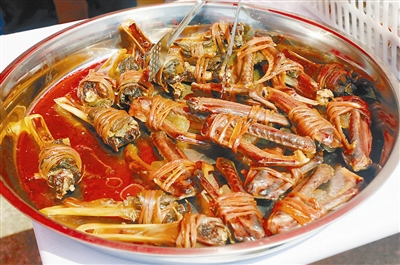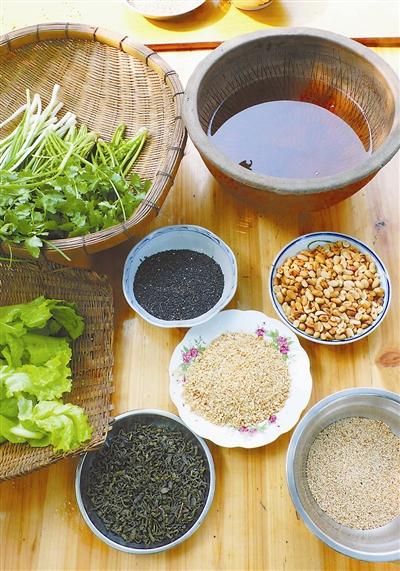Ancestral duck, clam, rib, tea delights to rise again

Exceptional flavors created a century ago will again be resurrected at the annual Doumen Gourmet Cultural Festival to be held at the district Sports Stadium, in various towns, and on the streets from Oct 1 to 5.
Among the offerings are:
Hengshan Preserved Duck Bundles (Ya Zha Bao)
Preserved Duck Bundles are a provincial Intangible Cultural Heritage item. The dish contains uniquely well-preserved and sun-dried segments of duck soaked in a private recipe with distinctive ingredients adding flavor.
Preserved parts include wings, feet, livers, and intestines. The delicacy dates to the reign of Emperor Kuang Hsu (Guangxu) in the Qing Dynasty (1871-1908). Although the specialty was invented accidentally, its one-of-a-kind taste arose through the ages as repeated trials enhanced its features and popularity. Its exclusive processing skills have now been handed down to a fourth generation.
Local gourmets have commented that the dish has an important historical role since it truly records the evolution of Lianzhou folk dietary culture over the past hundred years.

Preserved Duck Bundles (YaZhaBao)
Hakka Salted Tea
Baijiao Town Hakka Salted Tea (Ham Cha) is a modified version of Lei Cha, or ground tea, a traditional Southern Chinese tea-based beverage or gruel.
Drinking the tea is a custom of the Hakka, the second-largest ethnic group in Taiwan. The beverage, unique to Baijiao, uses such ingredients as tea leaves, peanuts, soybeans, and sesame to flavor the vegetables. These include head lettuce, leaf lettuce, watercress, green beans, and green onions.
The tea has been proven helpful in eliminating fatigue due to heavy fieldwork and often supplements salt otherwise needed for the human body. It became popular in 1744 during the reign of Emperor Ch'ien-lung (Qianlong) in the Qing Dynasty, and was designated one of the third-group city-level Intangible Cultural Heritages in June 2010.

Hakka Salted Tea [Photos by Zhang Zhou / Zhuhai Daily]
Dachikan Open Flame Roast Pork & Spare Ribs
Roast Pork & Spare Ribs was listed as an Intangible Cultural Heritage item in Zhuhai in June 2015.
The traditional food is salty yet sweet, crisp but not tough, and most famous for its unusual gelatinous "mouth feel" when chewed. Its bright color provokes the appetite.
Created in the early days of the Republic of China (1912-49) by Zhao Chida in Dachikan Village, the requisite culinary skills have been passed to the fourth generation. It is set apart for not only unique Lingnan roast pork flavor, but also for a particular sauce formula and preparation process. The fresh pork and ribs of rural piglets are pickled with sauce and aired, then roasted in an uncommon oven with litchi wood. Crisp outside and tender within, a savory aftertaste lingers on.
Shangheng Steamed Yellow Sand Clams
Shangheng Village in Lianzhou Town teems with quality clams. Among the ways evolved to cook them, steaming with garlic on an aluminum plate has been adopted as a favorite for offering nutritional benefit and culinary enjoyment.
They are known as yellow sand clams because they are yellowish-green. The village abounds with them since it is situated at the marine outfall of the Xijiang River and is crisscrossed by a network of waterways. The clams are mostly large, thanks to the village's unique geography, and rich in protein with a variety of trace elements needed for health.
The delicious dish was once proudly served to distinguished guests in the region. The best season for the delicacy is February to April when nearby out-of-towners swarm to Shangheng to join locals in a clam feast.
The clams are not only a gastronomical delight, but also used as medicine to improve eyesight, serve as a diuretic, stimulate lactation, and eliminate dampness.
The specialty was recognized in September 2013 as one of Zhuhai's Intangible Cultural Heritage items.
Hushan Jinchao Pipa Duck
The exceptional process of roasting duck over litchi braches from Jinchao Deli in Hushan Village creates a fragrance and flavor that are remarkable a hundred years later.
A genealogy report shows that Huang Qihao, born in Hushan Village of Doumen District in 1842, was very much at home with roasting ducks, which were plentiful in the small village surrounded by waterways.
Second-generation inheritor Huang Chuyun found by accident that litchi, which abounds in the area, could endow a singular fragrance to roasted duck when burned like wood. Thus began the history of Litchi-Roasted Duck.
Third-generation inheritor Huang Eju named the delicacy Pipa Duck, reflecting its resemblance in shape to the pipa, a four-stringed Chinese musical instrument.
The roasting skill has now been passed to sixth-generation inheritor Huang Zhongren.
MOST POPULAR
- 1 China to give visa-free treatment to another 9 countries
- 2 China fully opens manufacturing sector to foreign investors in landmark opening up move
- 3 China's import expo attracts record-breaking participating countries, exhibitors
- 4 China's door opening even wider to foreign visitors, businesses
- 5 China revises rules to ease foreign strategic investment in listed firms
Editors' Picks
 Video:
Peru sees new port open
Video:
Peru sees new port open
 Infographic:
China's public holidays for 2025
Infographic:
China's public holidays for 2025
 Infographic:
Basic facts of APEC
Infographic:
Basic facts of APEC
 Infographic:
Wrapping up the 7th CIIE: Data recap
Infographic:
Wrapping up the 7th CIIE: Data recap



